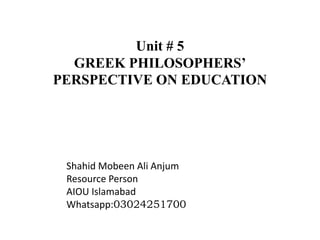The document summarizes the perspectives on education of three ancient Greek philosophers: Socrates, Plato, and Aristotle. Socrates used questioning to help people realize their own ignorance and seek truth. Plato's aim of education was human perfection and he emphasized mental development. He suggested curriculum including bodily development, music, and philosophy. Aristotle believed education's aim was individual happiness and welfare. He advocated a curriculum including gymnastics, music/literature, and mathematics. Education's role was complete realization of man through developing talents to the fullest.



























